The Spaghetti Nebula is a supernova remnant located approximately 3,000 light-years away in the constellation Taurus, on the border with Auriga. The remnant lies near Elnath at the Bull’s northern horn. It is catalogued as Simeis 147, Sharpless 2-240 (Sh2-240), and SNR G180.0-01.7.
The Spaghetti Nebula is a very large object. It has an apparent diameter of around 3 degrees – six full Moons – and a physical extent of approximately 160 light-years. The stellar debris cloud is believed to be around 40,000 years old. It is one of the oldest supernova remnants in the Milky Way that still has a well-defined structure.
The vast structure consists of stellar material that was expelled at highly supersonic speeds during the supernova event. It also contains the interstellar material that the expanding shock wave energizes along the way.
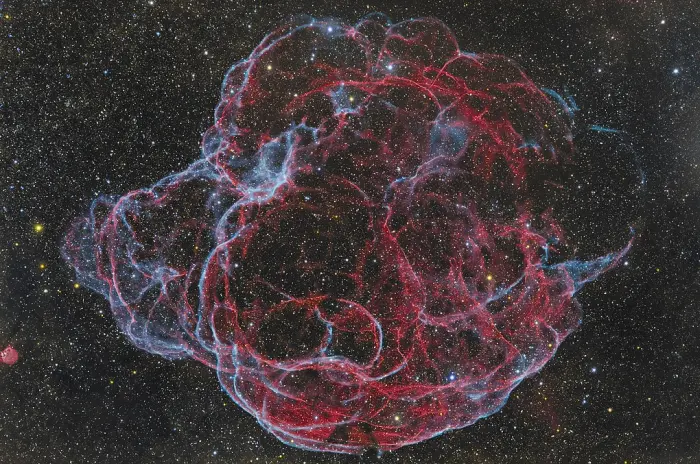
Simeis 147, also known as Sh2-240 or “Spaghetti nebula”, is a supernova remnant. The nebula is quite large and its shape is fairly spherical. It is located between the constellations Auriga and Taurus. Image credit: Maurizio Cabibbo (CC BY-SA 4.0)
The star that produced the remnant is now a fast-spinning pulsar catalogued as PSR J0538+2817. The fast-spinning neutron star was discovered by a team of astronomers led by S. B. Anderson at the Department of Astronomy and Astrophysics at Pennsylvania State University in 1994.
The astronomers detected the pulsar using the Arecibo radio telescope in Puerto Rico. They reported that it appeared 40 arcminutes west of the centre of the remnant. The pulsar’s estimated age and distance were consistent with the age of the remnant.
Subsequent observations with the Arecibo telescope, the Very Large Array (VLA) in New Mexico, and the Effelsberg 100-m Radio Telescope, operated by the Max Planck Institute for Radio Astronomy in Germany, provided sufficient evidence for the physical association between the pulsar and the supernova remnant.
Pulsars are only rarely associated with their parent supernova remnants. Young pulsars can be too faint for detection in the radiation of the remnants, or their beams of emission may not be pointing toward Earth. Some may even be ejected from their birthplaces in the aftermath of the supernovae that produced them. They are usually detected after a targeted search within the boundaries of their associated remnants.
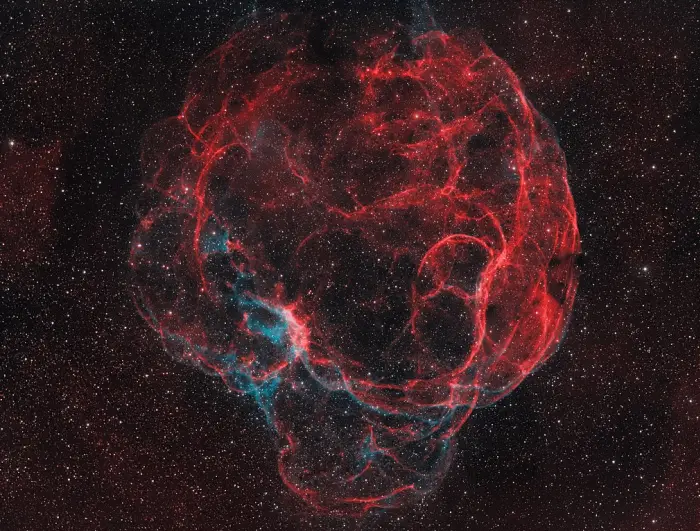
Spaghetti Nebula (Sh2-240), image credit: Nico Carver (nebulaphotos.com) (CC BY-SA 4.0)
Facts
The Spaghetti Nebula was discovered photographically by Grigory Shajn at the Crimean Astrophysical Observatory in 1952. Shajn and his team used a Schmidt camera and a narrowband filter. The nebula would not be easily visible in regular images.
Location
The Spaghetti Nebula appears in the region of Auriga’s hexagon, on the border between the constellations Auriga (the Charioteer) and Taurus (the Bull). It lies just southeast of Elnath, the second brightest star in Taurus.
The Spaghetti Nebula is large, but has a very low surface brightness, which makes it an exceptionally challenging target, both for amateur astronomers and astrophotographers.
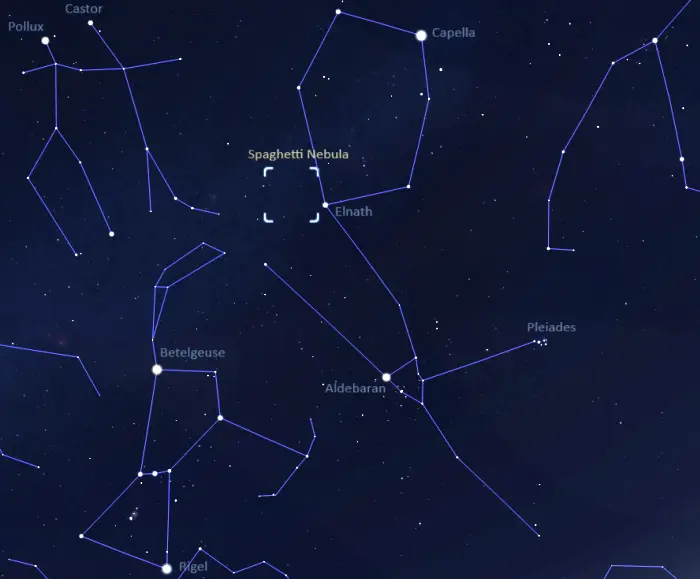
The location of the Spaghetti Nebula (Simeis 147), image: Stellarium
The best time of the year to observe the Spaghetti Nebula and other deep sky objects in Taurus is during the month of January, when the constellation appears higher in the sky in the early evening. At declination 28° N, the nebula is visible from locations north of the latitude 62° S.
Spaghetti Nebula – Simeis 147
| Constellation | Taurus |
| Object type | Supernova remnant |
| Right ascension | 05h 39m 06s |
| Declination | +27° 59′ 55″ |
| Apparent magnitude (peak) | 6.5 |
| Apparent size | 3 degrees |
| Distance | 3,000 light-years (0.92 kiloparsecs) |
| Names and designations | Spaghetti Nebula, Simeis 147, Sharpless 2-240 (Sh2-240), SNR G180.0-01.7, 1FGL J0538.6+2717, 2FGL J0538.1+2718, 2FHL J0534.1+2753, 3FHL J0537.6+2751e, 3FGL J0540.3+2756e, 4FGL J0540.3+2756e |
Images
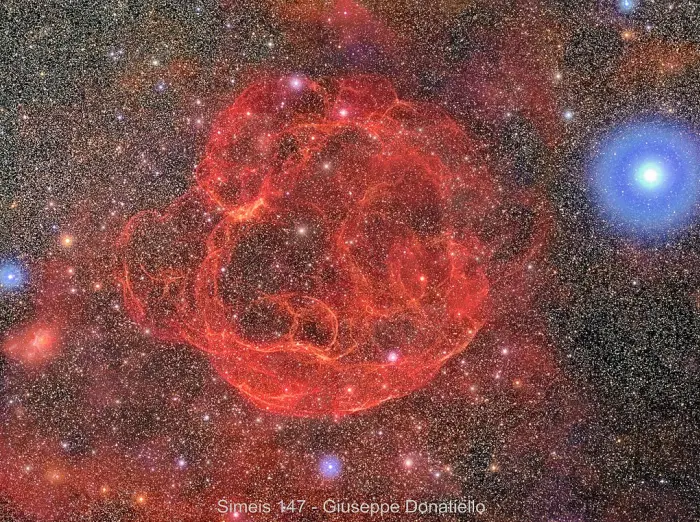
Simeis 147, also known as the Spaghetti Nebula, SNR G180.0-01.7 or Sharpless 2-240, is a supernova remnant (SNR) in Auriga and Taurus. Discovered in 1952 at the Crimean Astrophysical Observatory using a 25-inch Schmidt-Cassegrain telescope, it is difficult to observe due to its extremely low brightness. Image credit: Giuseppe Donatiello / WISE 3.4 – 4.6 microns (CC0 1.0)
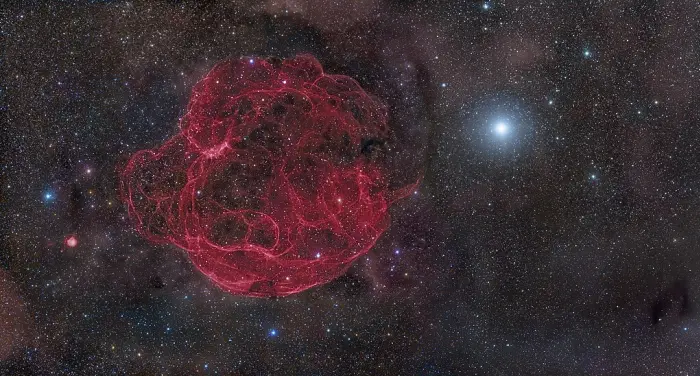
Photograph by Rogelio Bernal Andreo of Simeis 147. Also known as the Spaghetti Nebula and cataloged as Sharpless 2-240, this filamentary structure can be found in the constellation Taurus, close to the border of Auriga, in roughly the same line of sight as the star Elnath. Image credit: Rogelio Bernal Andreo (CC BY-SA 3.0)
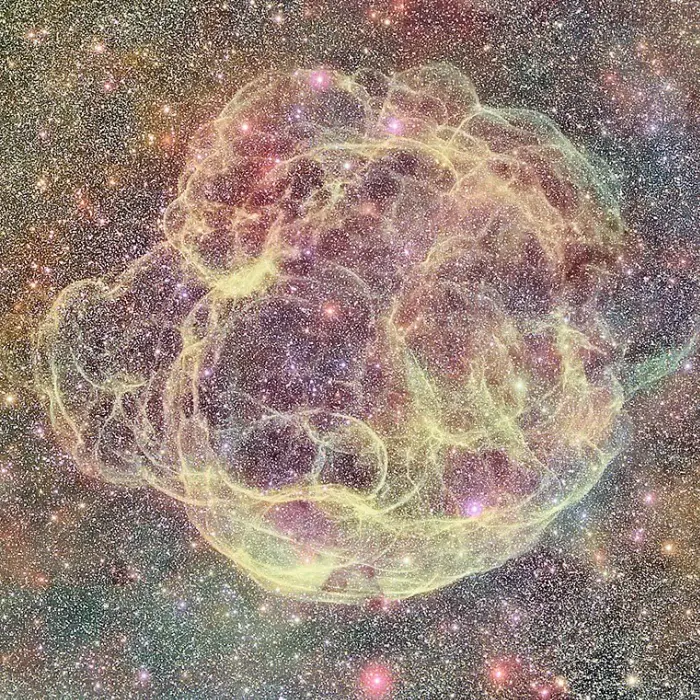
Spaghetti Nebula (Simeis 147), credit: Giuseppe Donatiello, Tim Stone, WISE (CC0 1.0)
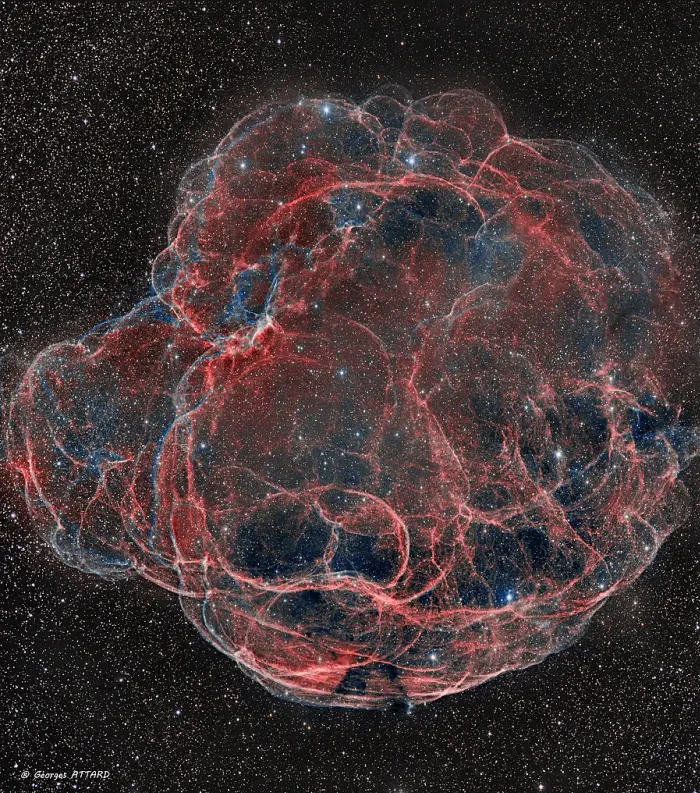
This composite narrow-band image Halpha et OIII, is the remnant of a massive supernova event 40,000 years ago. Image: Georges Attard (CC BY-SA 4.0)